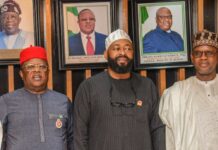Your Story on SAMOA “Baseless”, Ombudsman tells Daily Trust
POLITICS DIGEST- The National Media Complaints Commission (NMCC), also known as the Ombudsman, Monday released the report of its investigation into a complaint made to it against the Daily Trust by the Federal Ministry of Information and National Orientation.
The commission, in its 19-page report, said after scrutinising the complaint of the government, as well as the response of the newspaper, which it had sought and obtained, found the Daily Trust story complained about as “inaccurate”.
The NMCC, however, also accused the federal government of poor handling of issues around the Samoa Agreement it signed, stating that had the government demonstrated “greater openness, transparency and accountability” in dealing with matters relating to the deal, “the attendant conjectures and speculations about the content of the Samoa Agreement could have been avoided.”
The ombudsman, nonetheless, asked the Daily Trust to issue an apology for the inaccuracies in its report on the Samoa Agreement.
The NMCC, chaired by Emeka Izeze, former Managing Director of The Guardian, has among its members, a former president of the Nigerian Bar Association (NBA), Mr A. B. Mahmoud (SAN); a Deputy Vice Chancellor of Paul University, Awka, Anambra State, Prof. Chinyere Stella Okunna; the Editor-in-Chief of Diamond Publication, Mr Lanre Idowu; and the Executive Director of Media Rights Agenda (MRA), Mr Edetaen Ojo.
Other members of the body are Mrs. Dupe Ajayi-Gbadebo, a journalist, lawyer and arbitrator; Mrs. Eugenia Abu, broadcaster, author, columnist and former Executive Director, Programmes at the Nigerian Television Authority (NTA); and Dr. Hussain Abdu, the Country Director of Care International (Nigeria).
In its verdict, the NMCC ruled that Daily Trust failed to meet journalistic standards as stipulated in the 2022 Revised Code of Ethics for Nigerian Journalists, stressing that the newspaper’s report complained about, which was published on July 4, 2024, was found to be inaccurate, particularly in suggesting that the Samoa Agreement contained provisions relating to the LGBTQ (lesbian, gay, bisexual, transgender and queer) rights.
The government’s original complaint, submitted by Dr Ngozi Onwudiwe, Permanent Secretary of the information ministry alleged that the report posed a threat to national security.
In its ruling, the Ombudsman found that the article complained about was inaccurate, and that it violated Article 2.1 of the Revised Code of Journalism Ethics, 2022.
It, therefore, directed Daily Trust to issue an apology in both its print and online editions, and that it should take internal editorial steps to prevent future occurrence.
Read Also:
Meanwhile, the Ombudsman, in the report, commended the complainant (the federal government) and the respondent (Daily Trust) for submitting themselves to the co-regulatory mechanism offered by the National Media Complaints Commission.
It also said that: “Whilst the Daily Trust may be commended for its healthy interest in a story of national and global importance as provided for in Articles 2.5 and 2.7 of the Code of Ethics, the same cannot be said for its performance with respect to the other provisions of the relevant portions of the Code, namely Articles 2.1, 2.2, 2.3, and 2.8.”
The Ombudsman said its investigation revealed that the Samoa Agreement did not, in fact, contain any clauses relating to LGBTQ issues.
The commission cited a briefing document from the European Parliamentary Research Service, noting that while earlier drafts of the agreement referenced contentious issues such as sexual orientation and gender identity, the final signed version excluded such provisions.
“The NMCC finds that the 403-page Samoa Agreement does not in fact contain any clause that compels underdeveloped and developing nations to support the agitations by the Lesbian, Gay, Bisexual, Transgender, and Queer (LGBTQ) community for recognition as a condition for getting financial and other supports from advanced nations. Indeed, there is no reference whatsoever in the agreement to the issue of LGBTQ,” the report stated.
Furthermore, the NMCC criticised the federal government’s lack of transparency in handling issues relating to the Samoa Agreement.
According to the commission, “This controversy could have been avoided if the government had been more forthcoming on the Samoa Agreement by proactively announcing to the Nigerian people that the federal government had signed the agreement as well as explaining the essentials, implications and benefits of the agreement to the country and to the Nigerian people shortly after it signed the document.”
The Ombudsman stressed the need for improved public communication from the government, warning that secrecy erodes public trust.
“Transparency and accountability are crucial aspects of the democratic process, including for the purpose of earning and enjoying public trust. It would certainly have helped to inform the public about the agreement much earlier, with copies of it made publicly available for those who are interested in more details to access and read,” it said.
The NMCC closed its report with a strong recommendation for the government to adopt a more open and proactive approach to information dissemination, particularly in matters of public interest.
“In this digital age, the lesson here should be that proactivity in information dissemination across all offices of the government and all tiers of government on matters of public interest is a non-negotiable element of democratic governance.
“The government and all its institutions have an obligation to abolish the prevailing culture of secrecy in governance, as it gives the impression that government holds its citizens in contempt,” the commission said.

















